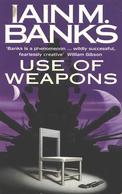
| Publisher: | Orbit |
| Copyright: | 1990 |
| Printing: | 2003 |
| ISBN: | 1-85723-135-X |
| Format: | Trade paperback |
| Pages: | 372 |
Diziet Sma is from the Culture, Banks's highly-advanced, galaxy-spanning near-utopia. She works for Special Circumstances, the part of the Culture that practices a sort of enlightened political meddling in the affairs of other cultures for their own good. Cheradenine Zakalwe is one of her best agents, a non-Culture former general who has been dropped into many previous situations and done whatever the Culture needed him to do to further their plans, often without having any clear idea of what the goal was or where his actions fit. At the start of Use of Weapons, Zakalwe has gone off on his own, but a political situation in a volatile star cluster has taken a turn for the worse and the Culture needs him to convince a local politician to come out of retirement.
Use of Weapons has a confusing structure that takes some time to puzzle out. It's told in two primary narrative threads, one following Diziet and Zakalwe and the immediate problem and going forward in time, and a second thread told in interleaved chapters that follows Zakalwe's career for the Culture backwards in time to his planet of origin. To make matters more confusing, Zakalwe's backwards-moving thread is riddled with further flashbacks, and there are prologues and epilogues to fit into the chronology in other confusing ways. I'm not sure it's possible to fully settle the chronology in one's head in a single reading, at least without taking notes.
Thankfully, this isn't as confusing as it sounds when it comes to the story. The precise chronology isn't that important; the goal is thematic, with Zakalwe's career episodes forming a sort of flashback sequence within the main, relatively straightforward SF adventure narrative. The forward arc of the story is space opera, full of sardonic wit and the sort of audacious stunts one can pull when one has access to far-superior technology and the support of the galaxy's greatest power. The backward arc is the depth, the ugly details under the surface, the desperation, the past that made Zakalwe into a weapon that the Culture is using so effectively. The forward arc is often light but ends with a nasty surprise; the backward arc sets the reader up for the surprise and makes it clear that nothing's quite as pleasant as it may appear.
On the surface, this, like all Banks SF that I've read, is entertaining space opera. The unassailable utopian nature of the Culture provides an air of distance, but it's not as strong here where Zakalwe gets most of the screen time and is not fully in the Culture's world. But both the Culture's power and Zakalwe's often devil-may-care, jaded attitude provide plenty of opportunities for sarcasm, wit, and a streetwise forward momentum that makes me think of spy movies. The surface narrative isn't particularly memorable, but it's quite entertaining.
Underneath, though, something more significant lurks but doesn't surface. I never got a clear impression of what the theme was supposed to be, but there's enough material that I came up with possibilities after finishing Use of Weapons and more kept occuring over the next few days. It's that sort of book: the more I thought about it, the deeper it looked.
There's an air of imperialism and colonialism about the Culture's meddling, but it's mixed with some hard questions of morality. If one is essentially all-powerful, isn't there some obligation to act, however high-handed that may be? And with Zakalwe, Banks adds the conundrum of recruiting agents, the ambivalent attitude towards people who aren't with the good guys but work for them, and the often deeply broken pasts that drive people willing to become such agents. If the surface story is about Zakalwe as an expert in weapons and war, the under-story is about Zakalwe as a weapon, and about who and what the Culture have to be to use him as one.
The three-page concluding bit entitled "States of War" brings the conflict to its sharpest point and I think is the moment where the ethical questions around the Culture snap into perspective. Use of Weapons has both a traditional twist ending that rewrites large chunks of the story and an epilogue that recasts motives, they both work, and they don't even work in the same direction. It's a remarkable trick, even if it's also frustratingly vague. The reader receives a lot of facts but has to build an ethical position and an analysis without a great deal of help.
At the story level, this is a good but not great book. What I like best about it came from thinking it over after finishing it and trying to figure out what it meant, what stance the book takes, and what stances I wanted to take about the ideas of the book. This may or may not work for other readers. Banks doesn't provide much of a map, and I may well be wandering through a different set of ethical questions than he even intended. If it works for you like it worked for me, though, it's a surprisingly effective interrogation of concepts of sovereignty, intervention, political manipulation for a "greater good," moral obligations, and using and being used for causes. Be prepared to think about this one a little, and if complex chronological structures confuse you, you might want to take notes.
Reviewed: 2008-06-25